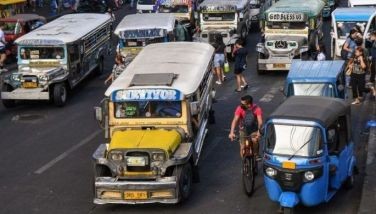Duterte to human rights groups: See drug problem for yourselves
August 25, 2016 | 8:25pm
MANILA, Philippines -- President Rodrigo Duterte has asked human rights advocates who are critical of his anti-drug war to come to the Philippines to see the situation for themselves, even promising to shoulder all their costs including their toilet paper.
Duterte, who has been accused of condoning the summary executions of suspected drug personalities, said that while he is trying to address a huge problem, his critics are doing nothing but talk.
“I will fund you. I will pay (for everything). I will even buy you your toilet paper,” Duterte said in a late night press conference in Davao City on Wednesday.
“Mga gago kayo (Fools). Don’t talk and talk there. I have a problem here. (We have) 600,000 (drug addicts),” he added.
In the wake of a statement from two UN special rapporteurs reminding the Philippine government of its obligation to ensure the right to life and safety of all Filipinos, whether suspected of crimes or not, Chief Presidential Legal Counsel Salvador Panelo issued a challenge for them to come to the Philippines to see the situation firsthand.
UN special rapporteur Agnes Callamard indicated she was willing to visit the Philippines, but the Palace soon made clear that no formal invitation had been extended.
Duterte on Wednesday challenged human rights groups to also consider the law enforcers and soldiers who died in anti-drug operations. He claimed that an average of two policemen die every day because of the war on narcotics.
According to Philippine National Police data presented to the Senate this week, nine police officers were killed and 19 were wounded in anti-illegal drug operations between July 1 and Aug.18.
In the same period, three soldiers were killed and 18 were wounded in similar operations.
“Is there anybody among you, human rights advocates who are counting the dead soldiers and policemen?” the president said.
He defended law enforcers anew from allegations that they are behind the killing of suspected drug pushers and users.
“Some of those who died were placed inside sacks or plastics. The police, I assure you, would not waste their time on that,” the president said.
“You might as well include everyone in the funeral parlor, even those who died of cancer or diabetes because you blame all deaths on us,” he added.
“The accusation itself is stupid.”
'Syndicates behind killings'
Critics of the drug war have not said the police are behind the killings, some of whose victims were found with cardboard signs declaring them as drug pushers or criminals. Some, including Callamard, have said, however, that Duterte's statements that drug pushers should be killed if they resist tend to encourage impunity over the killings.
“Directives of this nature are irresponsible in the extreme and amount to incitement to violence and killing, a crime under international law. It is effectively a license to kill,” she said earlier this month.
Duterte reiterated that operatives have sown intrigues among drug rings and hinted that members of syndicates may be killing each other.
“We are not prohibited from using that kind of methodology,” he said.
International human rights groups have expressed concern over the spate of killings in the country, which has been attributed to the intensified drive against illegal drugs and crime.
Amnesty International asked Duterte to “fulfill his inauguration pledge to uphold the country’s commitment to international law and lead a break with the country’s poor human rights record.”
“President Duterte has been elected on a mandate to uphold the rule of law. It is encouraging that he spoke of honoring the Philippines’ obligations under international law in his inauguration speech. But now he is in power, he needs to lend substance to those words and break with his earlier rhetoric,” said Rafendi Djamin, Amnesty International’s Director for South East Asia and the Pacific.
Another group, Human Rights Watch, said the situation in the Philippines can now be a considered a “national emergency.” The group also claimed that the Philippine government is “trampling” on the freedoms and universal rights of Filipinos.
More than 600 people have been killed in anti-drug operations, according to police data.
BrandSpace Articles
<
>
- Latest
- Trending
Trending
Latest
Trending
Latest
Recommended































